Table of Contents
- 9+ Supplier Evaluation Questionnaire Templates in MS Word | PDF
- 1. Supplier Evaluation Questionnaire Template
- 2. Supplier Evaluation Questionnaire Example
- 3. Sample Supplier Evaluation Questionnaire
- 4. Printable Supplier Evaluation Questionnaire
- 5. Basic Supplier Evaluation Questionnaire
- 6. Standard Supplier Evaluation Questionnaire
- 7. Petroleum Supplier Evaluation Questionnaire
- 9. Supplier Quality Evaluation Questionnaire Template
- 10. Simple Supplier Evaluation Questionnaire
- How do you do supplier evaluation?
- Why is supplier evaluation important?
- What is a supplier survey?
- Frequently Asked Questions
9+ Supplier Evaluation Questionnaire Templates in MS Word | PDF
Supplier evaluation and supplier appraisal are words used in business and indicate to the process of assessing and accepting potential suppliers by quantitative assessment. The aim of the process is to assure a portfolio of best-in-class suppliers is ready for use. Supplier evaluation and approval can be based on past performance. A supplier evaluation questionnaire is used by Quality Assurance personnel to assess your Quality Assurance inclinations. Submittal of this questionnaire, by itself, does not constitute an approval of your organization as an authorized cause. Have a look at the supplier evaluation questionnaire templates provided.

9+ Supplier Evaluation Questionnaire Templates in MS Word | PDF
1. Supplier Evaluation Questionnaire Template
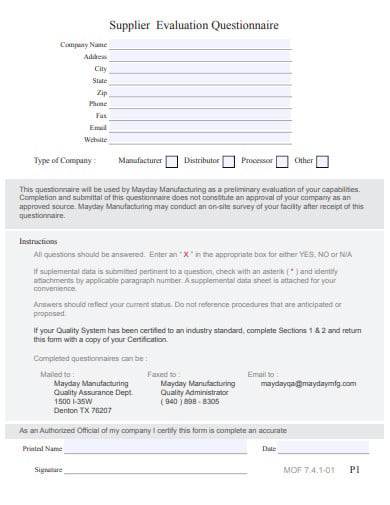 maydaymfg.com
maydaymfg.com2. Supplier Evaluation Questionnaire Example
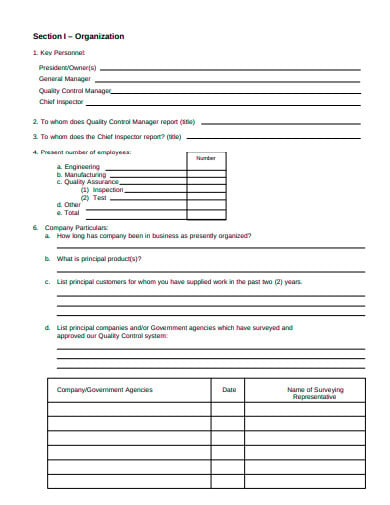 elsmar.com
elsmar.com3. Sample Supplier Evaluation Questionnaire
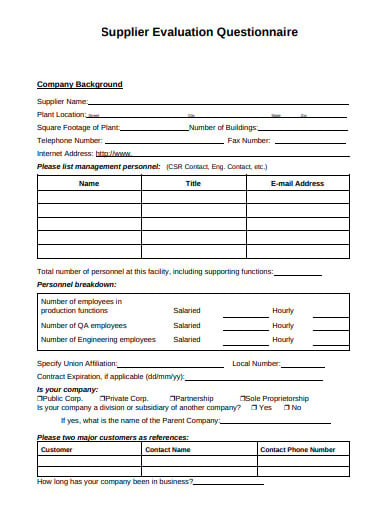 imminet.com
imminet.com4. Printable Supplier Evaluation Questionnaire
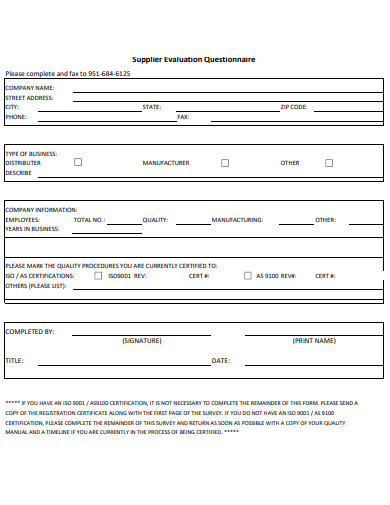 ferrariinterconnect.com
ferrariinterconnect.com5. Basic Supplier Evaluation Questionnaire
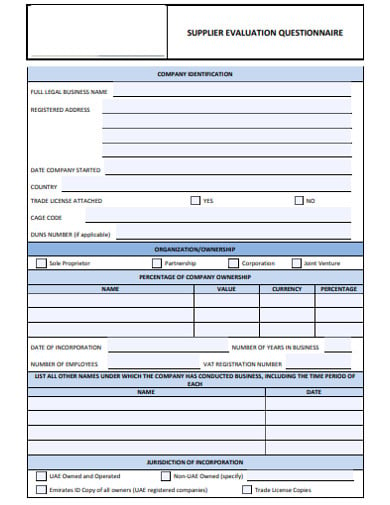 ammroc.ae
ammroc.ae6. Standard Supplier Evaluation Questionnaire
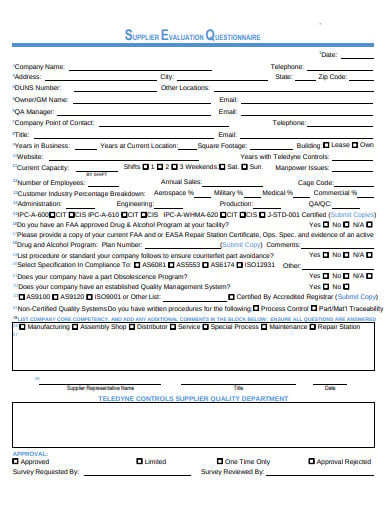 teledynecontrols.com
teledynecontrols.com7. Petroleum Supplier Evaluation Questionnaire
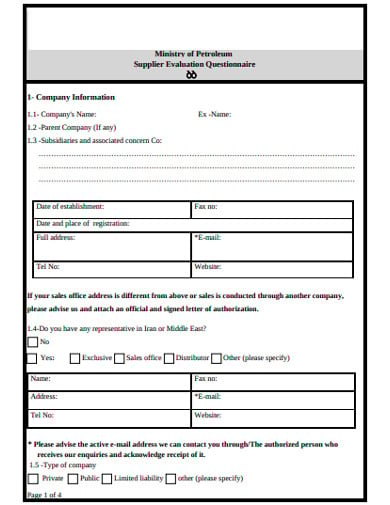 iooc.co.ir
iooc.co.ir9. Supplier Quality Evaluation Questionnaire Template
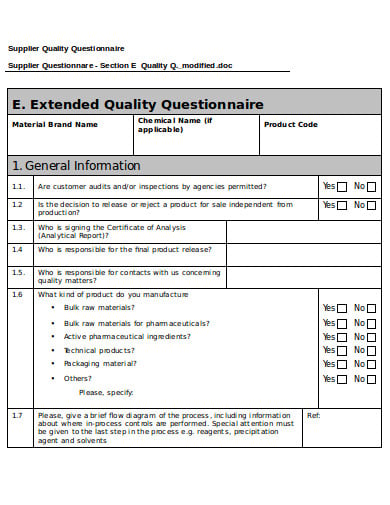 apic.cefic.org
apic.cefic.org10. Simple Supplier Evaluation Questionnaire
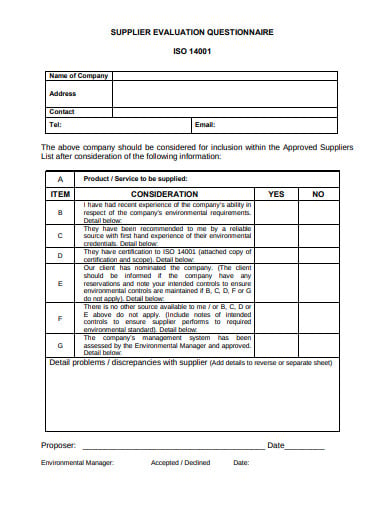 sovereigncertification.com
sovereigncertification.comHow do you do supplier evaluation?
If you need to conduct a successful supplier evaluation, here are the points which you can follow.
1. Good interaction with your suppliers
Knowing from the start that the supplier is easily accessible for questions, sets a transcendent foundation for a customer-supplier relationship. It should be transparent who the central contact person will be, as well as his ability to effectively communicate your needs with his own team. It is also significant that should obstacles occur, you have the capacity to speak with senior executives on the team.
2. Competency
Check out the suppliers’ capabilities against your needs. Most of these service lists are accessible on their websites or in handouts, but talking to account heads or agents privately will give you an even additional look into the true expertise of the supplier. Getting data from other customers related to you will also be of huge help.
3. Capacity
Notice if the supplier has the ability to handle your demands and how fast they can deliver to you. How do they manage changes in supply and what are their resources to service all customers?
4. Commitment
Check their commitment to giving only products of the highest quality. They should also imply that they are committed to you, as their customer, on a long-term basis.
5. Control
Ask about how much restriction the supplier has over the supply chain, the systems, and the methods. How can they guarantee that the delivery of goods to your company will remain steady and compatible?
6. Cash
A supplier can efficiently deliver on clients’ expectations when they have a good state of investment. Ask for evidence of the strength of their investments and make sure that they can overcome economic doubts.
7. Cost
This concerns to their pricing scheme. More frequently than not, supplier identifications depend largely on this, but be sure to keep in mind that standard does not always equate to high quality. The pricing is eventually just one of the parts to consider when choosing suppliers.
8. Consistency
Can the supplier consistently give high-quality goods? A good reason for this is to ask how long they have been working with their other clients. If they need long-standing relationships with alternative purchasers, it’s a decent sign that they’ll endlessly deliver over time.
9. Culture
As much as organization culture is significant to your business, it should also manifest in your supplier. Values such as speed, feature, perfection, modification, and dependability are existent in trustworthy organizations and you want to be sure that the same can be said about your own suppliers.
10. Clean
Are your supplier’s production methods sustainable? Are their processes environment-friendly and are they ethical in the way they treat their employees? Are they capable of handling growth and able to expand as your business expands too?
Why is supplier evaluation important?
Vendor evaluation is important as it can reduce supply chain costs and improve the quality and timeliness of the delivery of items to your company. The skill in evaluating vendors is to determine which criteria are important and the weighting that these criteria are given.
What is a supplier survey?
A Supplier Survey is used by a company to collect information from current and/or prospective suppliers to gauge whether or not they satisfy specific social and environmental criteria that are meaningful to that company.
Frequently Asked Questions
What is the supplier evaluation criteria?
Supplier evaluation and supplier assessment are words utilized in business and relate to the purpose of assessing and approving possible suppliers by quantitative assessment. The purpose of the process is to assure a portfolio of best-in-class suppliers is available for use.
What is the vendor evaluation process?
Vendor evaluation is a method for documentation and judging the performance of a supplier in terms of a variety of issues, which may consist of delivery performance and the condition of the items. A process of vendor rating is necessary for effective purchasing.
What is the supplier development process?
development is the method of working with specific suppliers on a one-to-one base to enhance their performance for the advantage of the buying organization.
What are the benefits of supplier development?
Benefits of Supplier Development are as follows:
Enhanced knowledge and collaboration sharing throughout the elongated enterprise.
Improved responsiveness to customer requirements and market dynamics.
What is the supplier selection process?
Supplier selection is the means by which firms classify, assess, and contract with suppliers. The supplier selection process uses an enormous amount of a firm’s financial resources. In return, firms assume important advantages from contracting with suppliers allowing high value.






